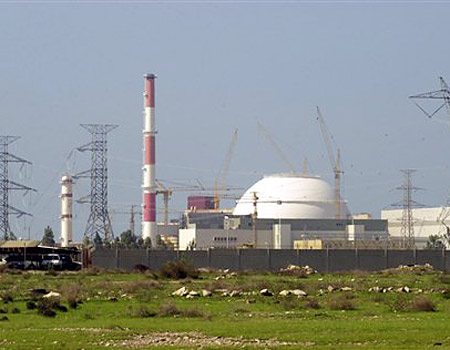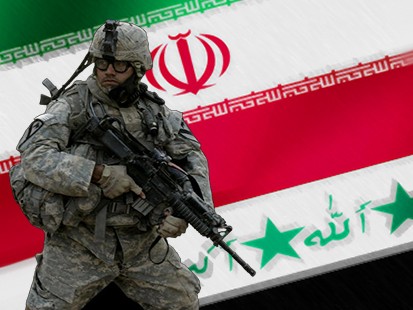Re: Consequences Of Attacking Iran And Why Tehran Is Not Worried
US military leaders are marching to a noticeably softer drumbeat on Iran than President George W. Bush, hoping to dispel fears that US military action against Tehran is imminent. Bush startled the world last month by raising the prospect of a "World War III" if Iran acquires the knowledge to build nuclear weapons. Days later, Vice President xxxx Cheney told a Washington think tank: "We will not allow Iran to have a nuclear weapons."
Since then, however, top US military leaders have made it known that military action against Iran is "a last resort," one that would create enormous complications for US forces already tied down in Iraq and Afghanistan. And they have complained about the drumbeat of speculation that the United States is preparing strikes against Iranian nuclear facilities, saying it harms US efforts to draw Iran onto a more positive path. "None of this is helped by the continuing stories that just keep going around and around and around that any day now there will be another war which is just not where we want to go," Admiral William Fallon, the head of the US Central Command, told the Financial Times this week.
A senior military official said Fallon was not alluding to the White House rhetoric on Iran but referring broadly to the swirl of media reporting about US military options against Iran's nuclear program. But the questions about US plans and intentions have been propeled at least in part by the tough talk from the White House, which has left the impression that the military and administration hardliners are at odds over how to deal with Iran. "I think there is a picture of more of a division than there really is," said a second senior military official, who, like the first, spoke on condition of anonymity. "My sense is there isn't a great chasm between the two."
But since assuming office October 1, Admiral Michael Mullen, the new chairman of the Joint Chiefs of Staff, has expressed deep skepticism about military action against Iran. "I think we have to be very mindful of risks associated with follow-on steps which would engage us in a third country in that part of the world in any kind of conflict," he told an audience of defense experts recently. Like Mullen, US Defense Secretary Robert Gates calls for international efforts to squeeze Iran economically, while making clear that the military option offers little appeal. "That is a contingency -- that is, if Iran were to do something that is not smart. At this point we're focused on diplomatic and economic sanctions," said Pentagon press secretary Geoff Morrell. So far, though, Iran has failed to yield to diplomatic and financial pressure to halt its uranium enrichment program, raising questions about what comes next.
"Clearly, what we'd like is for Iran to take a more productive and positive role in the region, and that is where the focus is right now. And Admiral Fallon is working that very hard right now," the military official said. There are signs that the US military is working to lower tensions with Iran in Iraq. It released nine Iranian detainees who had been accused of aiding insurgents in Iraq. At least three other Iranians remain in US custody, but the US military decided the nine could go, because they were no longer of intelligence value and posed no threat.
That step came just days after US military commanders in Iraq acknowledged a drop in the use of Iranian-made armor piercing explosives known as EFPs over the past three months. Military officials denied that the two developments were linked and said it remains unclear whether Iran slowed the flow of weapons into Iraq after a visit to Tehran in August by Iraqi Prime Minister Nuri Al-Maliki. "While we welcome the fact that there has been a reduction in Iranian related attacks -- and that's everything from EFPs to rocket attacks, we still believe it is too soon to tell it's a direct result of that," Morrell said.
Whatever the cause, the US military is celebrating a sustained drop in violence in Iraq that has set the stage for a phased drawdown of the 167,000 US troops there over the next year. US saber-rattling on Iran's nuclear program, on the other hand, could lead Tehran to turn up the heat again in Iraq. Michael O'Hanlon, a military expert at the Brookings Institution, notes that the US military is on a "quick time horizon" in Iraq, while Iran's quest for nuclear weapons is a slower-moving challenge. "So maybe we have people like Fallon ... saying to the Iranians through the back channel, 'If you guys cut it out (in Iraq), we're not going to attack you in the next year,'" he said.
Source: http://afp.google.com/article/ALeqM5...CG4zQ0JzIrmKaA
US military leaders march to a softer beat on Iran


US military leaders are marching to a noticeably softer drumbeat on Iran than President George W. Bush, hoping to dispel fears that US military action against Tehran is imminent. Bush startled the world last month by raising the prospect of a "World War III" if Iran acquires the knowledge to build nuclear weapons. Days later, Vice President xxxx Cheney told a Washington think tank: "We will not allow Iran to have a nuclear weapons."
Since then, however, top US military leaders have made it known that military action against Iran is "a last resort," one that would create enormous complications for US forces already tied down in Iraq and Afghanistan. And they have complained about the drumbeat of speculation that the United States is preparing strikes against Iranian nuclear facilities, saying it harms US efforts to draw Iran onto a more positive path. "None of this is helped by the continuing stories that just keep going around and around and around that any day now there will be another war which is just not where we want to go," Admiral William Fallon, the head of the US Central Command, told the Financial Times this week.
A senior military official said Fallon was not alluding to the White House rhetoric on Iran but referring broadly to the swirl of media reporting about US military options against Iran's nuclear program. But the questions about US plans and intentions have been propeled at least in part by the tough talk from the White House, which has left the impression that the military and administration hardliners are at odds over how to deal with Iran. "I think there is a picture of more of a division than there really is," said a second senior military official, who, like the first, spoke on condition of anonymity. "My sense is there isn't a great chasm between the two."
But since assuming office October 1, Admiral Michael Mullen, the new chairman of the Joint Chiefs of Staff, has expressed deep skepticism about military action against Iran. "I think we have to be very mindful of risks associated with follow-on steps which would engage us in a third country in that part of the world in any kind of conflict," he told an audience of defense experts recently. Like Mullen, US Defense Secretary Robert Gates calls for international efforts to squeeze Iran economically, while making clear that the military option offers little appeal. "That is a contingency -- that is, if Iran were to do something that is not smart. At this point we're focused on diplomatic and economic sanctions," said Pentagon press secretary Geoff Morrell. So far, though, Iran has failed to yield to diplomatic and financial pressure to halt its uranium enrichment program, raising questions about what comes next.
"Clearly, what we'd like is for Iran to take a more productive and positive role in the region, and that is where the focus is right now. And Admiral Fallon is working that very hard right now," the military official said. There are signs that the US military is working to lower tensions with Iran in Iraq. It released nine Iranian detainees who had been accused of aiding insurgents in Iraq. At least three other Iranians remain in US custody, but the US military decided the nine could go, because they were no longer of intelligence value and posed no threat.
That step came just days after US military commanders in Iraq acknowledged a drop in the use of Iranian-made armor piercing explosives known as EFPs over the past three months. Military officials denied that the two developments were linked and said it remains unclear whether Iran slowed the flow of weapons into Iraq after a visit to Tehran in August by Iraqi Prime Minister Nuri Al-Maliki. "While we welcome the fact that there has been a reduction in Iranian related attacks -- and that's everything from EFPs to rocket attacks, we still believe it is too soon to tell it's a direct result of that," Morrell said.
Whatever the cause, the US military is celebrating a sustained drop in violence in Iraq that has set the stage for a phased drawdown of the 167,000 US troops there over the next year. US saber-rattling on Iran's nuclear program, on the other hand, could lead Tehran to turn up the heat again in Iraq. Michael O'Hanlon, a military expert at the Brookings Institution, notes that the US military is on a "quick time horizon" in Iraq, while Iran's quest for nuclear weapons is a slower-moving challenge. "So maybe we have people like Fallon ... saying to the Iranians through the back channel, 'If you guys cut it out (in Iraq), we're not going to attack you in the next year,'" he said.
Source: http://afp.google.com/article/ALeqM5...CG4zQ0JzIrmKaA














Comment